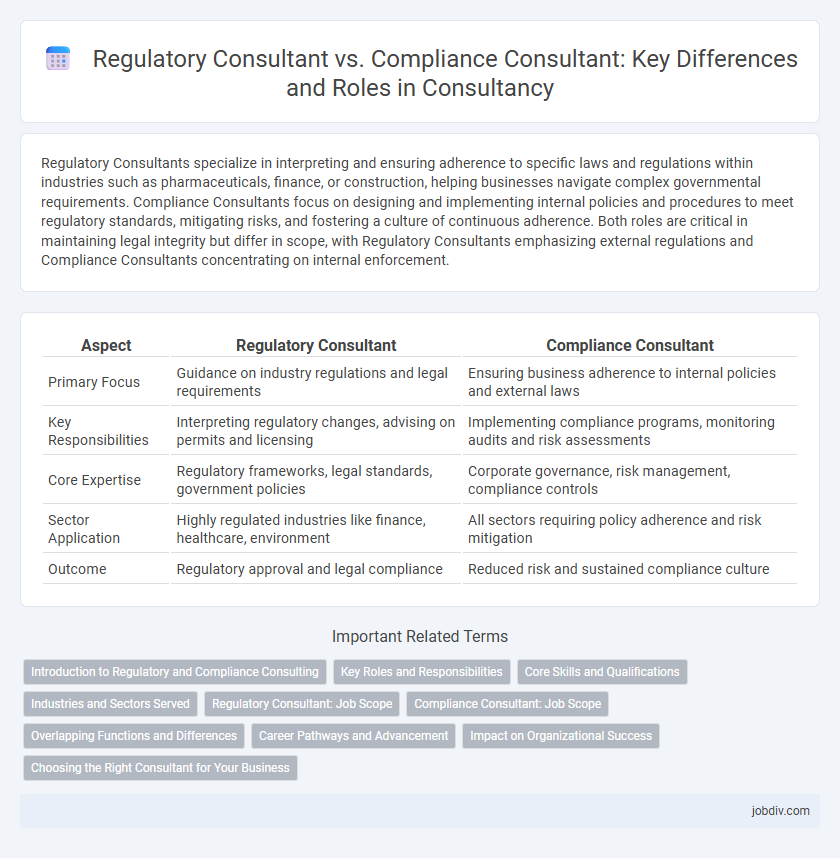Regulatory Consultants specialize in interpreting and ensuring adherence to specific laws and regulations within industries such as pharmaceuticals, finance, or construction, helping businesses navigate complex governmental requirements. Compliance Consultants focus on designing and implementing internal policies and procedures to meet regulatory standards, mitigating risks, and fostering a culture of continuous adherence. Both roles are critical in maintaining legal integrity but differ in scope, with Regulatory Consultants emphasizing external regulations and Compliance Consultants concentrating on internal enforcement.
Table of Comparison
| Aspect | Regulatory Consultant | Compliance Consultant |
|---|---|---|
| Primary Focus | Guidance on industry regulations and legal requirements | Ensuring business adherence to internal policies and external laws |
| Key Responsibilities | Interpreting regulatory changes, advising on permits and licensing | Implementing compliance programs, monitoring audits and risk assessments |
| Core Expertise | Regulatory frameworks, legal standards, government policies | Corporate governance, risk management, compliance controls |
| Sector Application | Highly regulated industries like finance, healthcare, environment | All sectors requiring policy adherence and risk mitigation |
| Outcome | Regulatory approval and legal compliance | Reduced risk and sustained compliance culture |
Introduction to Regulatory and Compliance Consulting
Regulatory consultants specialize in interpreting and applying government regulations to ensure businesses meet legal standards, focusing on sectors like pharmaceuticals, finance, and environmental management. Compliance consultants design, implement, and monitor internal policies and procedures to ensure ongoing adherence to industry-specific laws and standards, reducing organizational risks. Understanding the distinctions and overlaps between regulatory and compliance consulting helps organizations navigate complex legal landscapes efficiently and avoid costly penalties.
Key Roles and Responsibilities
Regulatory consultants specialize in interpreting and advising on industry-specific laws, ensuring clients meet all governmental regulations from product development to market entry. Compliance consultants focus on designing and implementing internal policies and controls to maintain adherence to legal standards and corporate governance requirements. Both roles are essential for mitigating risk, but regulatory consultants prioritize external legal frameworks while compliance consultants emphasize internal process alignment.
Core Skills and Qualifications
Regulatory consultants possess in-depth knowledge of industry-specific laws, standards, and governmental regulations, focusing on interpreting and implementing regulatory requirements effectively. Compliance consultants specialize in designing and managing internal policies, risk assessments, and audit responses to ensure organizational adherence to regulatory frameworks. Both roles require strong analytical skills, expertise in regulatory documentation, and proficiency in risk management, with regulatory consultants emphasizing external legal alignment and compliance consultants concentrating on internal control mechanisms.
Industries and Sectors Served
Regulatory consultants specialize in industries with stringent government oversight, such as pharmaceuticals, finance, and energy, ensuring adherence to evolving legal frameworks and industry-specific standards. Compliance consultants serve a broader range of sectors including healthcare, manufacturing, and technology, concentrating on internal policies and risk management to meet regulatory and corporate governance requirements. Both roles are critical in heavily regulated markets but differ in targeting external legal mandates versus internal operational controls.
Regulatory Consultant: Job Scope
Regulatory consultants specialize in guiding organizations through complex legal frameworks, ensuring adherence to government regulations across industries such as pharmaceuticals, finance, and manufacturing. Their job scope includes interpreting regulatory requirements, preparing submissions for regulatory agencies, and advising on risk management to avoid legal penalties. They play a crucial role in product approvals, policy implementation, and maintaining ongoing compliance with changing laws.
Compliance Consultant: Job Scope
A Compliance Consultant specializes in ensuring organizations adhere to legal standards, industry regulations, and internal policies to mitigate risks and avoid penalties. Their job scope includes conducting compliance audits, developing and implementing compliance programs, and providing ongoing training to staff on regulatory requirements. They work closely with regulatory bodies, management teams, and auditors to maintain up-to-date knowledge of compliance laws and facilitate seamless regulatory reporting.
Overlapping Functions and Differences
Regulatory consultants specialize in interpreting and ensuring adherence to government laws and industry-specific regulations, providing strategic guidance on legal frameworks. Compliance consultants focus on implementing internal policies and controls to meet these regulations, emphasizing risk management and operational adherence. Both roles overlap in monitoring regulatory changes and advising on best practices, but they differ in scope, with regulatory consultants concentrating on external rules and compliance consultants managing internal enforcement.
Career Pathways and Advancement
Regulatory consultants specialize in navigating laws and regulations specific to industries such as pharmaceuticals, finance, and environmental sectors, often starting as regulatory affairs specialists before advancing to senior advisory or management roles. Compliance consultants focus on ensuring organizational adherence to internal policies and external legal standards, with career growth typically leading from compliance analyst to chief compliance officer or risk management executive. Both pathways demand continuous education in evolving regulations, strong analytical skills, and strategic oversight abilities to progress into consultancy leadership positions.
Impact on Organizational Success
Regulatory consultants ensure organizations adhere to legal frameworks, minimizing risks of fines and sanctions, directly safeguarding operational continuity. Compliance consultants develop and implement internal policies, enhancing ethical standards and fostering a culture of accountability that boosts stakeholder confidence. Both roles drive organizational success by mitigating regulatory risks and promoting sustainable business practices.
Choosing the Right Consultant for Your Business
Regulatory consultants specialize in navigating industry-specific laws and government regulations, ensuring your business adheres to mandatory standards and avoids legal penalties. Compliance consultants focus on implementing internal policies and controls to meet regulatory requirements and enhance operational efficiency across various departments. Selecting the right consultant depends on your business needs: choose a regulatory consultant for expert guidance on external legal frameworks or a compliance consultant to strengthen internal risk management and policy enforcement.
Regulatory Consultant vs Compliance Consultant Infographic

 jobdiv.com
jobdiv.com